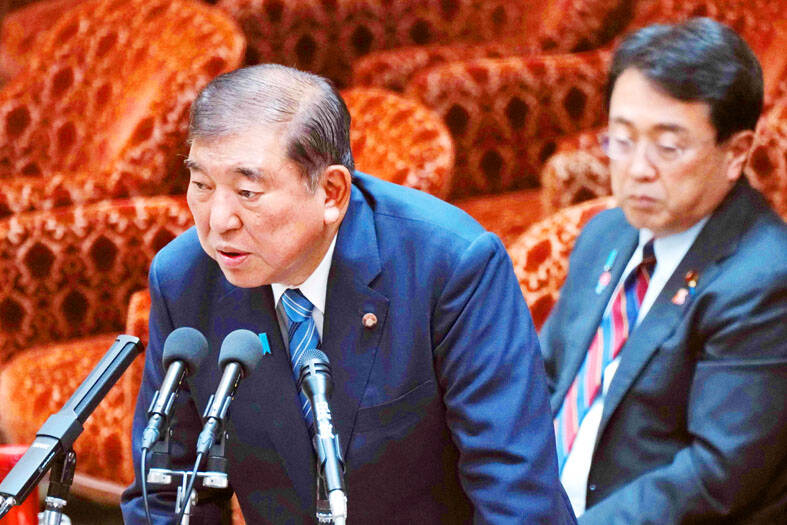Japanese Prime Minister Shigeru Ishiba yesterday said that he would not hesitate to hold talks with US President Donald Trump to ensure an agreed cut to US automobile tariffs is implemented soon.
In a parliament session, Ishiba drew criticism from some opposition lawmakers for not having signed an official document with the US in clinching a trade deal last month.
“Creating a document could have delayed the timing of tariff cuts. That was our biggest fear,” Ishiba said.

Photo: AFP
“He is not a typical counterpart and could overturn rules,” Ishiba said on Trump’s negotiating style.
Ishiba said he had “absolutely no hesitation” to hold talks with Trump to have Washington execute the tariff cut soon, although he declined to comment on when such talks could take place.
“Both countries will begin executing what was agreed upon, which is harder than agreeing on a deal,” Ishiba said, signaling his intention to stay on as premier to see through the process.
Ishiba is under pressure from within his ruling Liberal Democratic Party to step down as prime minister to take responsibility for the party’s huge defeat in last month’s upper-house election.
Japan’s trade deal struck with Trump last month lowers US tariffs on imports of goods including automobiles to 15 percent, easing the pain for the export-reliant economy.
However, there is no clarity on when US tariffs for automobiles and auto parts would be cut to 15 percent from the current 25 percent, clouding the outlook for Japan’s fragile recovery.
In the same parliament session, Japan’s top trade negotiator Ryosei Akazawa said it was hard to say how soon the US could actually implement automobile tariffs, though he added that it took “more than a month” in the case of Britain.
Akazawa also acknowledged criticism over the lack of having anything in writing.
“It’s my understanding having something on paper would be helpful,” Akazawa said, adding that there is also nothing in writing related to Washington’s deals with the EU and South Korea.

In Italy’s storied gold-making hubs, jewelers are reworking their designs to trim gold content as they race to blunt the effect of record prices and appeal to shoppers watching their budgets. Gold prices hit a record high on Thursday, surging near US$5,600 an ounce, more than double a year ago as geopolitical concerns and jitters over trade pushed investors toward the safe-haven asset. The rally is putting undue pressure on small artisans as they face mounting demands from customers, including international brands, to produce cheaper items, from signature pieces to wedding rings, according to interviews with four independent jewelers in Italy’s main

Japanese Prime Minister Sanae Takaichi has talked up the benefits of a weaker yen in a campaign speech, adopting a tone at odds with her finance ministry, which has refused to rule out any options to counter excessive foreign exchange volatility. Takaichi later softened her stance, saying she did not have a preference for the yen’s direction. “People say the weak yen is bad right now, but for export industries, it’s a major opportunity,” Takaichi said on Saturday at a rally for Liberal Democratic Party candidate Daishiro Yamagiwa in Kanagawa Prefecture ahead of a snap election on Sunday. “Whether it’s selling food or

CONCERNS: Tech companies investing in AI businesses that purchase their products have raised questions among investors that they are artificially propping up demand Nvidia Corp chief executive officer Jensen Huang (黃仁勳) on Saturday said that the company would be participating in OpenAI’s latest funding round, describing it as potentially “the largest investment we’ve ever made.” “We will invest a great deal of money,” Huang told reporters while visiting Taipei. “I believe in OpenAI. The work that they do is incredible. They’re one of the most consequential companies of our time.” Huang did not say exactly how much Nvidia might contribute, but described the investment as “huge.” “Let Sam announce how much he’s going to raise — it’s for him to decide,” Huang said, referring to OpenAI

Nvidia Corp’s negotiations to invest as much as US$100 billion in OpenAI have broken down, the Wall Street Journal (WSJ) reported, exposing a potential rift between two of the most powerful companies in the artificial intelligence (AI) industry. The discussions stalled after some inside Nvidia expressed concerns about the transaction, the WSJ reported, citing unidentified people familiar with the deliberations. OpenAI makes the popular chatbot ChatGPT, while Nvidia dominates the market for AI processors that help develop such software. The companies announced the agreement in September last year, saying at the time that they had signed a letter of intent for a strategic